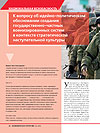In Search of a New Paradigm of Socio-Economic Development. Part I
DOI: 10.33917/es-5.197.2024.14-21
The most important conditions for socio-economic development of countries in the «era of globalization» are now rapidly turning into barriers. On the contrary, what was previously considered a burdensome cost to the national economy now can become a factor in generating benefits, including the economic ones. Macroeconomic targets begin to «lose» to fundamental political economic values. In such circumstances, the priority of economic policy becomes not a quantitative economic growth or nominal inflation and unemployment indicators, but a technological «leap» potential. The article problematizes the dominant paradigm of a global socio-economic development and outlines the contours of its alternative. This alternative, according to the authors, is capable to become a conceptual basis for global leadership in the 21st century.
References:
1. Who Cares Wins, 2004–08: Issue Brief. International Finance Corporation, available at: https://documents1.worldbank.org/curated/en/444801491483640669/ pdf/113850-BRI-IFC-Breif-whocares-PUBLIC.pdf
2. Arkhipova I., et al. Kak izmenilas’ ESG-povestka v novykh usloviyakh [How the ESG Agenda has Changed in the New Conditions]. Strategicheskie proekty. Novosti, 2023, 17 aprelya, available at: https://stratpro.hse.ru/social-policy/news/828220184.html
3. Ageev A.I., Bakhtizin A.R., Makarov V.L., Loginov E.L., Khabriev B.R. Ekonomicheskiy fundament pobedy: strategicheskiy prognoz ustoychivosti ekonomiki Rossii v usloviyakh sanktsionnykh atak [Economic Foundation of Victory: a Strategic Forecast for the Russian Economy Stability in the Face of Sanctions]. Ekonomicheskie strategii, 2023, no 3, pp. 6–15, DOI: https://doi.org/10.33917/es-3.189.2023.6-15
4. Lindsi Grem prizval NATO isklyuchat’ strany s nizkimi voennymi raskhodami [Lindsey Graham Calls on NATO to Exclude Countries with Low Military Spending]. RBK, 2024, 19 fevralya, available at: https://www.rbc.ru/rbcfreenews/65d275019a7947938d431365
5. Belousov E. CNN: Rossiya proizvodit vtroe bol’she boepripasov, chem Zapad mozhet dat’ Ukraine [CNN: Russia Produces Three Times More Ammunition than the West can Give Ukraine]. Kommersant”, 2024, 11 marta, available at: https://www.kommersant.ru/doc/6561870
6. Pol’sha i Vengriya proigrali v sude po isku o mnogomilliardnykh dotatsiyakh ES [Poland and Hungary Lose Court Case over Multi-billion EU Subsidies]. Vedomosti, 2022, 16 fevralya, available at: https://www.vedomosti.ru/politics/news/2022/02/16/909624-polsha-i-vengriya-proigrali-v-sude
7. Remarks by President Biden on Bidenomics (Chicago, IL). The White House, June 28, 2023, available at: https://www.whitehouse.gov/briefing-room/ speeches-remarks/2023/06/28/remarks-by-president-biden-on-bidenomics-chicago-il/
8. Tolkachev S.A. Protivorechiya politicheskoy ekonomii “baydenomiki” [The Contradictions of the Political Economy of “Bidenomics”]. Voprosy politicheskoy ekonomii, 2023, no 4, pp. 55–75.
9. Remarks by National Security Advisor Jake Sullivan on Renewing American Economic Leadership at the Brookings Institution. The White House. April 27, 2024, available at: https://www.whitehouse.gov/briefing-room/speeches-remarks/2023/04/27/remarks-by-national-security-advisor-jake-sullivan-onrenewing-american-economic-leadership-at-the-brookings-institution/





